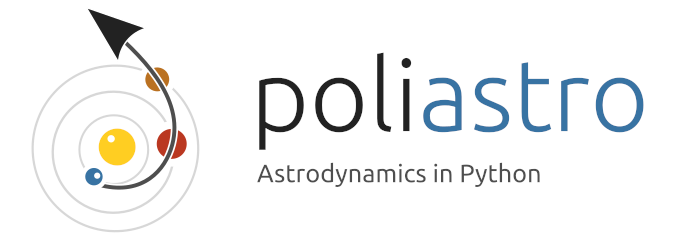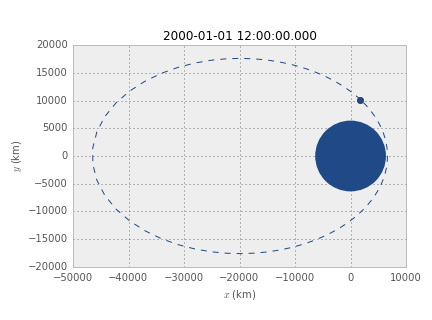Utilities and Python wrappers for Orbital Mechanics
Project description
| Name: | poliastro |
|---|---|
| Website: | https://www.poliastro.space/ |
| Author: | Juan Luis Cano Rodríguez  |
| Version: | 0.17.0 |
poliastro is an open source (MIT) pure Python library for interactive Astrodynamics and Orbital Mechanics, with a focus on ease of use, speed, and quick visualization. It provides a simple and intuitive API, and handles physical quantities with units.
Some features include orbit propagation, solution of the Lambert's problem, conversion between position and velocity vectors and classical orbital elements and orbit plotting, among others. It focuses on interplanetary applications, but can also be used to analyze artificial satellites in Low-Earth Orbit (LEO).
from poliastro.examples import molniya
molniya.plot()
Documentation
Complete documentation, including a user guide and an API reference, can be read on the wonderful Read the Docs.
Examples
In the examples directory you can find several Jupyter notebooks with specific applications of poliastro. You can launch a cloud Jupyter server using binder to edit the notebooks without installing anything. Try it out!
https://mybinder.org/v2/gh/poliastro/poliastro/0.17.x?labpath=index.ipynb
Requirements
poliastro requires the following Python packages:
- NumPy, for basic numerical routines
- Astropy, for physical units and time handling
- numba, for accelerating the code
- jplephem, for the planetary ephemerides using SPICE kernels
- matplotlib, for orbit plotting
- plotly, for 2D and 3D interactive orbit plotting
- SciPy, for root finding and numerical propagation
poliastro is supported on Linux, macOS and Windows on Python 3.8 to 3.10.
Installation
The easiest and fastest way to get the package up and running is to install poliastro using conda:
$ conda install poliastro --channel conda-forge
Please check out the documentation for alternative installation methods.
Problems and suggestions
If for any reason you get an unexpected error message or an incorrect result, or you want to let the developers know about your use case, please open a new issue in the issue tracker and we will try to answer promptly.
Contributing
poliastro is a community project, hence all contributions are more than welcome! For more information, head to CONTRIBUTING.md.
Support
Release announcements and general discussion take place on our Mailing List .
For further clarifications and discussions, feel free to join Poliastro Chat Room.
Citing
If you use poliastro on your project, please drop me a line.
You can also use the DOI to cite it in your publications. This is the latest one:
And this is an example citation format:
Juan Luis Cano Rodríguez et al.. (2015). poliastro: poliastro 0.4.0. Zenodo. 10.5281/zenodo.17462
License
poliastro is released under the MIT license, hence allowing commercial use of the library. Please refer to the COPYING file.
Credits
Contributors
This project exists thanks to all the people who contribute!
Backers
Thank you to all our backers! Become a backer.
Sponsors
Support us by becoming a sponsor. Your logo will show up here with a link to your website. Become a sponsor.
FAQ
What's up with the name?
poliastro comes from Polimi, which is the shortened name of the Politecnico di Milano, the Italian university where I was studying while writing this software. It's my tiny tribute to a place I came to love. Grazie mille!
Is poliastro validated?
Yes! poliastro is a community project that strives to be easy to use, while at the same time producing correct results that are validated against other commonly used Astrodynamics software such as GMAT and Orekit.
Can I suggest new features for poliastro?
Sure, we encourage you to open an issue so we can discuss future feature additions!
What's the future of the project?
poliastro is actively maintained and receiving an influx of new contributors thanks to the generous sponsorship of Google and the European Space Agency. The best way to get an idea of the roadmap is to see the Milestones of the project.
Project details
Release history Release notifications | RSS feed
Download files
Download the file for your platform. If you're not sure which to choose, learn more about installing packages.
Source Distribution
Built Distribution
Hashes for poliastro-0.17.0-py3-none-any.whl
| Algorithm | Hash digest | |
|---|---|---|
| SHA256 | fcbf870376b18b8356af249352c2eb2b1e335e96c19df272afb7c8c6f5c6c7b5 |
|
| MD5 | dc47bf4a93154e78aba38a468386ac01 |
|
| BLAKE2b-256 | a02a69163c09d250c555af027d5e2f3cbacddde65aea81a6678ece6b5744a683 |





























